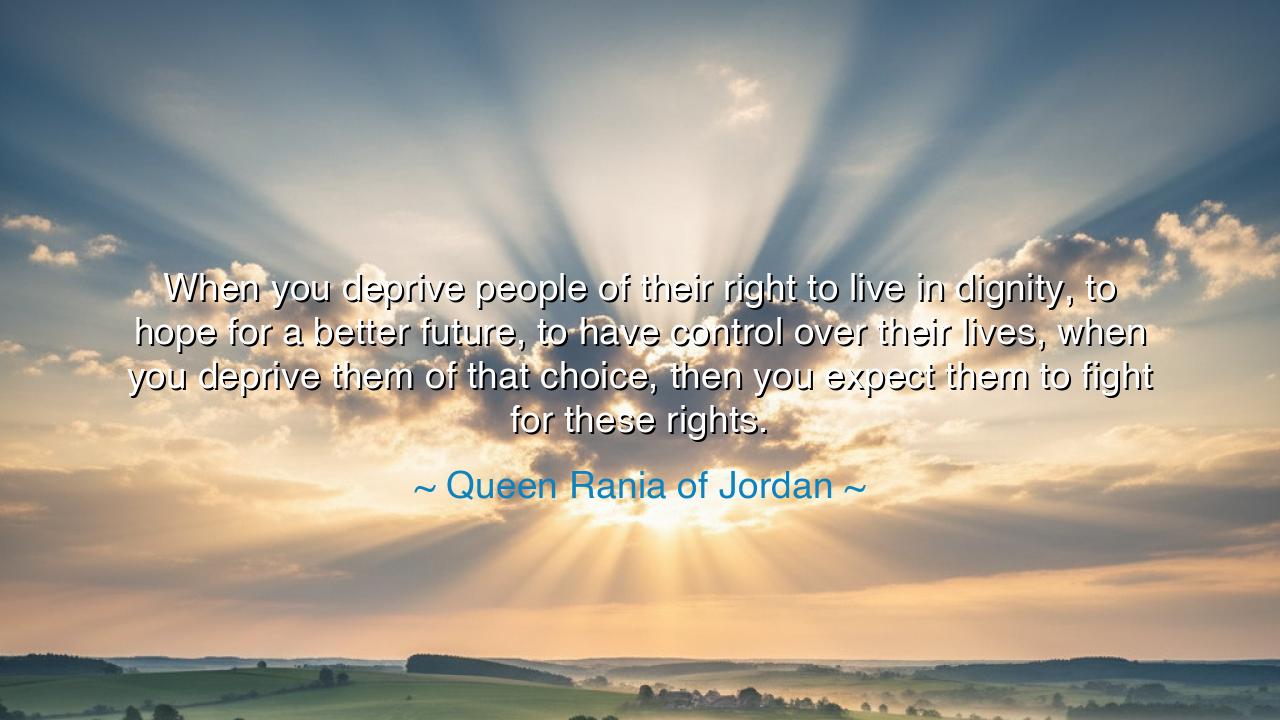
When you deprive people of their right to live in dignity, to
When you deprive people of their right to live in dignity, to hope for a better future, to have control over their lives, when you deprive them of that choice, then you expect them to fight for these rights.






The words of Queen Rania of Jordan—“When you deprive people of their right to live in dignity, to hope for a better future, to have control over their lives, when you deprive them of that choice, then you expect them to fight for these rights”—resound with the moral authority of both compassion and truth. They are not the cold reasoning of a ruler, but the fiery wisdom of a woman who has seen the anguish of nations and the cry of humanity for justice. In her voice, we hear the echo of the ancients, who long ago taught that when freedom and dignity are denied, the soul of a people cannot remain silent. Deprivation breeds defiance; oppression summons courage; and when the human spirit is chained, it rises all the more fiercely to break those chains.
These words spring from the deep soil of modern struggle. Queen Rania, a leader and advocate for education, equality, and peace in the Arab world, has spoken often of the suffering born from instability, poverty, and conflict. Her insight is not a call to violence, but a warning—a truth that rulers and citizens alike must heed: that dignity is as essential to life as air, and that to strip a person of it is to invite rebellion against the order that denies it. For every human being carries within them a sacred longing: the right to choose, to dream, and to steer one’s own destiny. When those rights are stolen, the fire of resistance is kindled in the human heart.
History has proven this truth time and again. Consider the French Revolution, born not from greed, but from despair. The people of France, long burdened by poverty and humiliation under the weight of monarchy and privilege, rose like a tide against their oppressors. They demanded not gold, but dignity; not vengeance, but justice. When bread was scarce and voices were silenced, their cries filled the streets, and the world trembled. So too did the American Revolution begin—not from hatred, but from a longing for freedom and self-determination. The colonists, denied their rights and taxed without representation, declared that life, liberty, and the pursuit of happiness were not gifts granted by kings, but birthrights endowed by creation itself. These revolutions, however imperfect, were born of the same law that Queen Rania speaks: that when hope is denied, resistance becomes inevitable.
And yet, her message carries not only the warning of revolt but the call to wisdom. For she does not glorify rebellion—she grieves its necessity. Her words are a plea to prevent suffering before it arises, to govern with justice, and to listen before the silence breaks into cries of unrest. She speaks as one who understands that the sword of rebellion, once drawn, leaves scars on both the oppressor and the oppressed. The wise ruler, she implies, must not wait for revolt to remember compassion. Dignity is the foundation of peace, and the peace that denies justice is no peace at all.
In her wisdom, there is also a lesson for every soul, not only for nations. Each person is a leader in the small kingdom of their own world—among family, community, and work. When we deny others their voice, their worth, or their chance to grow, we commit the same error as tyrants. A child silenced becomes defiant; a worker dismissed becomes disheartened; a friend ignored becomes distant. To honor dignity in others is to sow harmony; to deny it is to reap conflict. Whether between nations or hearts, respect is the soil from which peace grows.
The ancients taught that the greatest rulers were those who governed by the balance of mercy and strength. Marcus Aurelius, emperor and philosopher, wrote that to lead is to serve—that no man can truly rule another without first understanding his pain. Queen Rania’s words breathe that same ancient truth into the modern age. To build a lasting future, she reminds us, we must first build it upon the pillars of hope and humanity. Where there is dignity, there is stability; where there is respect, there is resilience. Without them, no empire, no government, no family can endure.
Thus, the lesson is both ancient and eternal: honor the dignity of all people, for in doing so, you preserve your own. Let no position of power—great or small—blind you to the humanity that dwells in every face. Create spaces where voices are heard, dreams are nurtured, and choices are respected. When you give others control over their lives, you strengthen the fabric of peace. But when you take it away, you invite the storm. As Queen Rania of Jordan teaches, the future belongs to those who build with compassion, not those who rule by fear.
So let her words be remembered not as warning alone, but as prophecy of hope: if we nurture dignity, we nurture peace; if we guard the rights of others, we secure our own. For the fire of rebellion need never be kindled where the light of justice already shines.






AAdministratorAdministrator
Welcome, honored guests. Please leave a comment, we will respond soon